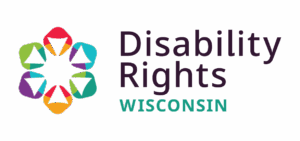Read the full article as an accessible PDF.
Disability Rights Wisconsin (DRW) Board of Directors announces that Kit Kerschensteiner will serve as the organization’s Interim Executive Director, effective June 1, 2023. Kerschensteiner has been with DRW for over 25 years and currently serves as the Director of Legal & Advocacy Services. Throughout her career, Kerschensteiner has fought for the rights of individuals with disabilities. In her current role, she oversees direct service programs, and she is a member of the organization’s leadership team. “During this transition, it brings comfort knowing that Kit’s leadership and knowledge of DRW will continue to move us forward during this time of transition,” stated Nancy Heltemes, DRW Board President.
After over 12 years with Disability Rights Wisconsin, Lea Kitz will be retiring on May 31, 2023. She served over four of those years as Executive Director and eight of them as Program Manager for the Family Care and IRIS Ombudsman Program (FCIOP). “DRW is fortunate to have such an impressive group of people who are so dedicated to making life better in Wisconsin for people with disabilities,” said Kitz. “It’s been a real privilege and I will miss them all.
The Board of Directors is actively conducting its search for DRW’s next Executive Director, and they are eager to bring on the next leader to guide the organization’s critical individual and systemic advocacy.
Disability Rights Wisconsin is the federally mandated Protection and Advocacy system for the state, charged with protecting the rights of individuals with disabilities and keeping them free from abuse and neglect. DRW uses a variety of strategies to achieve its mission, including individual casework and systemic change. The organization increases its effectiveness by collaborating with other advocacy and service organizations. It receives funding from federal and state grants, as well as other funding streams. Donations help DRW push forward public policy improvements that make a difference for thousands across the state.

